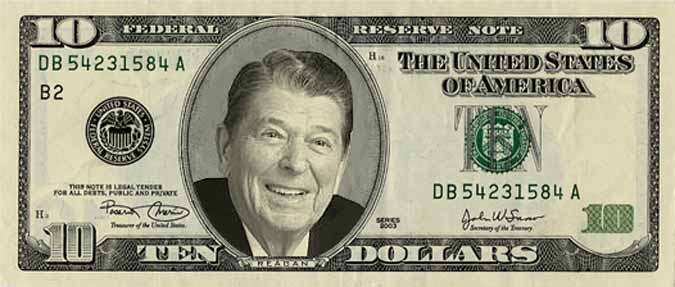
James Mann has now turned his eye on Reagan, The Rebellion of Ronald Reagan, focusing largely on his relationship with Gorbacev to read this review in The Economist. It seems Mann has a largely favorable view of the role Reagan played in the breakdown of the Soviet Union. This book follows Richard Reeves' inner view of the mind of Reagan in President Reagan: The Triumph of Imagination, which received mixed reviews, pretty much following the same formula he used for his compelling biographies on Kennedy and Nixon.
There was a time when historians appeared flummoxed as to how to approach Reagan, as Michiko Kakutani noted in his NYT review of Reeves' book. No more, it seems. Historians seem to be lining up behind Lou Cannon, who long held a favorable impression of The Great Communicator, and whose book, President Reagan: The Role of a Lifetime is still considered the best on the subject. Even Douglas Brinkley has gotten into the act by editing The Reagan Diaries.
I read Edmund Morris' Dutch sometime back, which I see is being reevaluated after some of the scathing criticism Morris took for introducing fictional characters into his narrative. I kind of liked it because Reagan is a hard figure to pin down and seemed to work more on the collective imagination of America than in any kind of empirical sense. While it may be "bad history," it is good storytelling.
Anyway, I'm not suggesting we take up Reagan, but given he is undergoing a transformation into icon status with attempts to put him on the ten-dollar bill and prefixing Washington's National Airport with his name, you get the sense Reagan will become a major part of our collective imagination for better or for worse.
There was a time when historians appeared flummoxed as to how to approach Reagan, as Michiko Kakutani noted in his NYT review of Reeves' book. No more, it seems. Historians seem to be lining up behind Lou Cannon, who long held a favorable impression of The Great Communicator, and whose book, President Reagan: The Role of a Lifetime is still considered the best on the subject. Even Douglas Brinkley has gotten into the act by editing The Reagan Diaries.
I read Edmund Morris' Dutch sometime back, which I see is being reevaluated after some of the scathing criticism Morris took for introducing fictional characters into his narrative. I kind of liked it because Reagan is a hard figure to pin down and seemed to work more on the collective imagination of America than in any kind of empirical sense. While it may be "bad history," it is good storytelling.
Anyway, I'm not suggesting we take up Reagan, but given he is undergoing a transformation into icon status with attempts to put him on the ten-dollar bill and prefixing Washington's National Airport with his name, you get the sense Reagan will become a major part of our collective imagination for better or for worse.
I just flew in and out of National Airport. Refuse to call it Reagan.
ReplyDeleteSeeing that $10 bill reminds me of the film, American Dream, which I think used to have a picture of the dollar bill on it -- and should have included Reagan's photo in the middle of it since he was the one who systematically killed all the unions.
Not all accounts are flattering. There is this one by William Kleinknecht that,
ReplyDelete"... sloughs off 30 years of polished hero imaging to reveal a disassociated, anti-poor, pro-rapacious business figurehead prodded this way and that by a gang of power brokers determined to strip away fiscal, health and transparency regulations."
http://www.rockymountainnews.com/news/2009/feb/19/the-man-who-sold-the-world-ronald-reagan-and-the/
Curious of Perlstein will take up Reagan next, as he refers to him often in Nixonland.